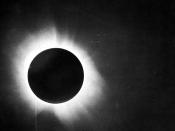Karl Popper came of age in the aftermath of the World War I. He left school at sixteen and soon found himself captivated with Marxism and its social implications. He turned away from Marxism however when he saw the destruction caused by left-wing demonstrators in Vienna, which led to the deaths of some of the protestors. He was a man of many studies, becoming interested not only in Marxist theories, but in astronomy and psychoanalysis, working for a time with the eminent psychologist Alfred Adler. A major turning point in his life was Arthur Eddington's successful test of Albert Einstein's general theory of relativity. He saw how Einstein had been critical of his own theory, constantly trying to pick holes in order to disprove or, as Popper saw it, improve it. This contrasted sharply with the attitude of Marxists and Psychoanalysis's who, it seemed to Popper, created theories and then re-interpreted them to suit any given situation.
This first encounter with empirical evidence and its foundation for the proving of theories would lead him to his eventual way of thinking about falsification theory.
Popper was profoundly impressed by the differences between the allegedly `scientific' theories of Freud and Adler and the revolution effected by Einstein's theory of relativity in physics in the first two decades of this century. The main difference between them, as Popper saw it, was that while Einstein's theory was highly `risky', in the sense that it was possible to deduce consequences from it which were, in the light of the then dominant Newtonian physics, highly improbable, and which would, if they turned out to be false, falsify the whole theory, nothing could, even in principle, falsify psychoanalytic theories (Thornton, 1997).
Popper himself gave an insight into his thinking about psychoanalysis in his paper 'Science as...


